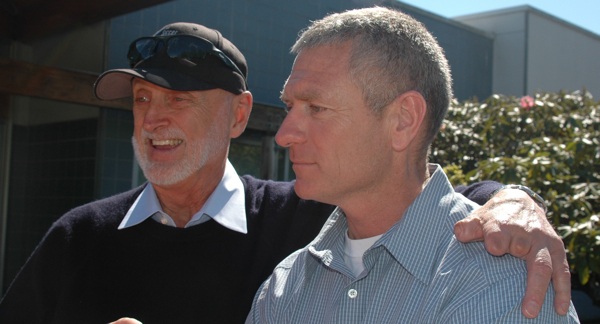MARYSVILLE — “I’m still cold now,” said Daniel Anderson, the day after he was rescued from an expedition into the wilderness gone awry.
Anderson, a Marysville resident and Washington State Patrol trooper, was off-duty when he and a few friends ventured east of Darrington, first by biking 11 miles, then by hiking 10 more miles, before camping out in the mountains on May 13. On May 14, Anderson parted company with the rest of his party to continue on to Holden Village.
“I screwed up,” said Anderson, whose military service has included stints in the Marines, the Special Forces and the National Guard. “I was confident in my training, but when you go off on your own like that, just one little thing can leave you so vulnerable.”
It was a trail he’d hiked before, and he’d brought two GPS units to keep himself on course, but the one stopped working and the other began leading him down a questionable path as he continued his hike on May 15. When he set up camp that evening, 800 meters past the wood line, he realized that he’d lost his tent in one of his falls.
“I knew it was an emergency situation,” Anderson said. “It was just a matter of time before hypothermia set in.”
Anderson used some pine branches, a flat, square boulder and the remaining rain cover of his tent, which he’d packed separately, to construct a lean-to that night, and hit the distress button on his spot locator GPS at 6:15 p.m. After a fitful rest with chattering teeth, Anderson chose to go back the way he came, or as close to it as he could.
“I tried to stay warm by moving rather than building a fire,” Anderson said. “I activated the spot locator on my GPS a few more times, to show that I was moving back along my path.”
While Anderson’s hike out had been in powder that he could trod across relatively easily in his snowshoes, he likened the hike back to trying to walk through sugar, because the snow was so loose. Later that same day, on May 16, he spotted a search and rescue helicopter, but was unable to signal its crew because he hadn’t brought flares.
“You hear that voice, telling you to rest,” Anderson said. “If you listen to it, that’s how you slip away.”
Anderson refused to give up, repeating the words, “I will not quit, I will not die, I will survive” as a mantra, as he thought of his two sons, 12-year-old Jacob and 8-year-old Christian. Shortly before 9 p.m. on May 17, he’d made it to within four miles of the start of the trail when he heard voices.
“I saw these four angels on horses, and I yelled, ‘Are you looking for me?'” Anderson said of his rescuers. “They saved my life. You can say, ‘Oh, he was only four miles away from the beginning of the trail, but then what? I still would have had to walk the length of a marathon just to get to where there are any cars, and I needed help.”
Anderson laughed as he acknowledged that, while his wife Julie has been sympathetic, his sisters Debbie and Denise “wanted to kill me” for his excursion. Although other adults tried to impress upon his sons the severity of the situation, Anderson reported that they were never worried, because in their words, “He’s Superman.”
Anderson expressed his gratitude and apologies to all those who had contributed to the search and rescue efforts.
“You’ll see beautiful stuff in the mountains that you simply wouldn’t see without negotiating the tough stuff, but when I saw all those cars and people as I was brought back, all I could think was, ‘What have I done?'” Anderson said. “When my buddies backed out of doing this with me, I should have shifted my schedule.”







